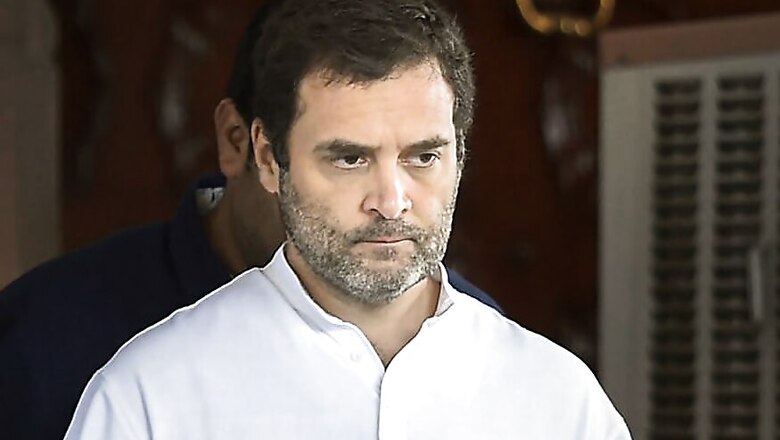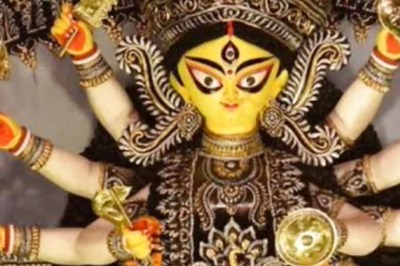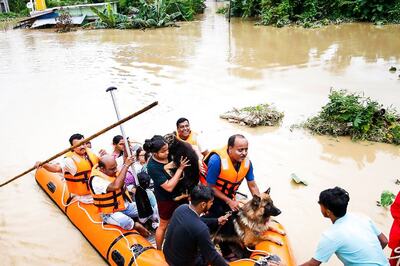
views
Lucknow: The day Congress president Rahul Gandhi filed his nomination from Wayanad in Kerala, political action also picked up pace in Amethi, his traditional constituency in Uttar Pradesh. While Gandhi’s ‘southern march’ is gradually becoming a topic of discussion in village markets and chai shops in Wayanad, in Amethi, BJP candidate Smriti Irani has raised a political storm by launching a fierce attack against the Congress president, calling him the “Missing MP”.
The Congress has cited ‘south outreach’ as the core idea behind Gandhi’s decision to also contest from Wayanad and said that the move should be in no way seen as a weakness or lack of commitment for his traditional seat Amethi, which he has represented in Parliament for the past 15 years.
But in Gandhi’s Wayanad move, the BJP seems to have found a much needed issue against him. Apart from the usual chorus of ‘neglect and lack of development in Amethi’, the party is trying its best to capitalise on the fact that Gandhi is contesting from two seats.
Lashing out at him in her first public meeting in Amethi after being renamed as the BJP candidate, Irani termed Gandhi as a “Missing MP”. She accused him of having done little for constituency and said, “The people of Amethi will defeat the Congress on May 6, the day Amethi goes to polls.”
Later, speaking exclusively with CNN News18, the union minister said: “Rahul Gandhi has got a detailed internal survey done by his men in Amethi. The report says he is losing here and that’s why he is also contesting from Wayanad”.
But amid these political claims and counterclaims, an analysis of the ground realities in the constituency, when compared with the 2014 general elections, suggests there is no visible narrative against the Congress or Rahul Gandhi in particular.
Compared to 2014, the ‘Modi wave’ does not seem to that strong this time. Also, just like the Samajwadi Party, the BSP has decided to not contest in Amethi. The decision is generally being seen as a goodwill gesture of the two parties towards Gandhi.
But what remains a fact is that the BJP, particularly Irani, has done serious homework in the region over the past five years. The party today has a robust organisation in four out of five assembly constituencies. It won them in the 2017 assembly elections. Compared to Gandhi, Irani has been more visible in Amethi by being in constant touch with the locals despite losing the 2014 battle. This is one factor which is now working in her favour.
From the demographic perspective, the constituency is dominated by the OBCs (including the most backward castes) and Dalit voters. Backward castes constitute around 36 percent and Dalits are 29 percent of the total voters. Amethi also has 15 percent Muslims voters and 19 percent upper caste Hindu voters.
But amid these demographic realties, there’s an important factor to consider. The OBC and Dalit castes that are generally inclined towards the SP and BSP don’t dominate the population statistics here. Among the Scheduled Castes, it’s the Pasi that are highest in number with a voter strength of around 17 percent. They are followed by Kori who constitute 6.5 percent votes. Chamar, who are generally seen as loyal towards the BSP, constitute only around 6 percent per cent of the electorate.
Among the OBCs, the Yadavs constitute only around 6.5 percent of the total electorate strength. The caste spectrum is being dominated by Maurya, Kushwaha, Saini and Sakya, who constitute around 9 percent votes. OBC castes such as Kumri and Lodhi are estimated to be around 5 percent. Apart from Yadavs, these other castes have generally been shifting their political loyalties.
The question is, can the Congress hope for continued support from these sections of Dalits and OBCs? Unlike the grand old party, the BJP has done some serious groundwork among these castes over the past few years. The 2014 poll results showed Gandhi’s victory margin had drastically reduced in Amethi, and one big reason for it was the shifting of these castes towards the BJP.
While the upper castes have generally sided with the BJP, the Muslims, who estimate around 15 percent of total electorate, have mostly voted for the Congress. In 2015, Gandhi won by a margin of just around one lakh votes. He had got around 37 percent votes and Irani had got around 35 percent votes.
The upper caste and minority electorate is expected to vote on a similar pattern this time as well. Hence, it is the OBC and Dalit voters who could emerge as the real game changers.
Also, the fact that SP-BSP alliance is not contesting in Amethi might be viewed as an ‘X factor’ that could go in favour of the Congress. But the counter narrative is that SP-BSP leadership is not really interested in ensuring that this vote shift doesn’t take place towards the BJP. In the absence of a strong caste-based leadership, it just might be a challenge for the Congress to win back those segments which it lost to the BJP in 2014.
Due to the hostility of the SP-BSP alliance, especially of BSP chief Mayawati, towards the Congress leadership, possibility of any grassroot level help coming Rahul Gandhi’s way seems difficult.
With Gandhi now campaigning across the country with his bigger political game plan, the burden of campaign and safeguarding the family stronghold will come to party’s general secretary in-charge of Uttar Pradesh, Priyanka Gnadhi. But the battle for Amethi will still not be an easy one.

















Comments
0 comment